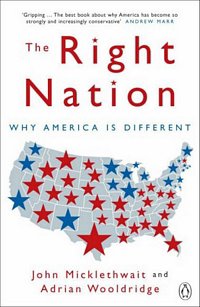
This book tries to paint a portrait of the conservative movement - of the people and institutions who have been responsible for pulling America to the right over the past thirty years. ... [however we also] try to examine why America is such a distinctive country ... so much more conservative than other advanced countries...
Sometimes an outsider's eyes are the keenest. The Right Nation gained fame for predicting a Bush win in 2004, but this attempt by two Britons – Economist (US) editor John Michelthwait and Washington correspondent Adrian Wooldrige – to probe America's political soul takes a longer view. These 21st-century Tocquevilles have produced what is arguably the best overview of the US conservative movement in print. More controversially, they argue that America is a naturally conservative nation.
They begin with an overview of the Republicans’ five-decade transformation from the party of the East Coast elite to that of the populist hinterland, from the party of the patrician and internationalist Prescott Bush to that of Prescott's bible-quoting, Texan-drawling grandson. The GOP’s reinvention is quite a tale in itself, but for the authors it’s the political face of a wider phenomenon: the rise of American conservatism, from a handful of fringe voices in the 1950's to a mass movement that dominates US politics.
It’s this story the book shows us, through an engaging milieu of interviews, travel journalism and history. The Right Nation is worth the read simply for its dissection of the empire of think-tanks, foundations, media outlets, political action committees, lobby groups, community organisations and talkback radio stations that US conservatism has built up over fifty years. One’s left in little doubt that notwithstanding their underdog complex, conservatives have become a rival establishment, whose influence will far outlast the 43rd presidency.
This new order has much stronger roots in US history than the liberal, internationalist face the US once presented to the world. America, Michelthwait and Wooldrige contend, is and always has been an essentially conservative nation. The country’s Puritan roots gave it an atypical religiosity and place for morality in public life. The Revolution bequeathed a constitutional system designed to limit government and preserve the status quo, and a political value set that cherished individual freedom over social engineering, however noble the cause. A seemingly endless supply of new land and opportunity spared American society the upheavals and revolutionary projects characteristic of the Old World. This political heritage is continually regenerated through education and public life, reinforced with the prestige of age; despite its mythology of national youth, the United States is one of the oldest countries in the world.
All this explains why the US has proved fertile ground for a popular conservative movement, a phenomenon unknown in other first world countries. Elsewhere in the developed world, the 'right' is a minority political party or extremist fringe group. In America it is a vast host drawn from across the social spectrum, mustered beneath a range of banners – gun rights, land rights, tax reform, abortion, homosexuality, school prayer, law and order, ‘family values’ – against the spectre of liberal elites out to destroy the American way of life. That way of life is defined by traditionalism, suspicion of government and exaltation of individual choice. The losers in this mix are equality, progressive social attitudes and state intervention – all things connoted by 'liberalism' in the US.
If you take one impression from The Right Nation, it’s the historically-grounded uniqueness of US ‘conservatism’: its populism, anti-elitism and progressive, almost messianic outlook are the opposite of what the term implies elsewhere. It's inconceivable that organisations like the NRA or the Christian Coalition could flourish in any other developed country. Where else in the developed world do four in five people identify as Christian, or one in three households own guns? Where else do 38 out of 50 states (plus the federal government) apply the death penalty? Where else is home-schooling a legal right in every state? America’s unforgiving treatment of lawbreakers, its hostility to state restrictions on laissez-faire, its confidence in the superiority of its social model, all set it apart from comparable societies.
The authors’ central point is that this package of attitudes, while it may have regional accents, is mainstream across the United States. From the Californian hinterland to the industrial Midwest, from small-town New England to the booming suburbs of Arizona, Americans have attitudes to basic social questions that differ significantly from the consensus elsewhere. Alone among developed countries, the US has never had a radical labour movement or a "left-wing" government, still lacks a comprehensive healthcare system and tolerates the biggest wealth gap in the First World* (surveys show that one in three Americans believe they will eventually get rich). US governments, Democrat and Republican, have consistently opposed recognition of 'social and economic' rights (as opposed to civil liberties) and efforts at supranational governance, such as the International Criminal Court. And even accounting for a ‘9-11’ effect, the overall public attitude in the US towards defining and prosecuting the ‘War on Terror’ – and specifically towards invading Iraq in 2003 – clearly differs from that overseas.
The Right Nation’s argument through
out is lucid, thorough and sufficiently nuanced to be convincing. The conservative movement they portray is a heterogeneous creature, with its share of internal contradictions – notably tension between 'small-government conservatives', who want the state out of their hair, and 'social conservatives', who want it on their side. But the big picture is of a national majority that, inverting Lyndon Johnson's famous statement about liberalism, stands against a lot of things and in favour of a mighty few.
The authors likewise avoid the pitfall of claiming that all Americans are conservatives, even latent ones; if nothing else, voting numbers in the last two presidential elections show that Blue, ‘liberal’ America represents a large chunk of the country. But the book makes a good case that Red America is bigger, and in the ascendant.
There are plenty of liberals in America, [but] liberalism as a governing philosophy is dead... Any hope of liberal America breaking out of that stranglehold is limited by what might be called the rule of the two-thirds: only one-third of the population these days wears the Democratic label, and only one-third of those Democrats describe themselves as liberals.
Looking forward, the authors can’t offer much for American liberals. US conservatives have demography as well as history on their side, with a young and growing population that leans right across boundaries of ethnicity and profession. Factor in trends ranging from union decline and rising share-ownership to the ‘War on Terror’, and it does seem that the Republicans are America's 'natural party of government' for the foreseeable future; certainly until the Democrats arrest the downward spiral into which their leftward turn during the 1960’s sent them.
The record shows that a party unable to play the conservative tune can’t build an election-winning base in the United States. The first two Republicans voted to the presidency after the 1960’s were both Californians; the two Democrats elected since then were both Southerners who in any other country would pass as right-wingers; in 2004, John Kerry lost because he failed to win constituencies (e.g. Ohioan blue-collar workers) that were pillars of the old Democratic coalition. Over the past four decades, conservatives have consistently set the political agenda, churned out the new ideas and tightened their hold on legislature and judiciary. It’s a grim outlook for anyone who’d like to believe that George Bush is a national anomaly, or that the Right’s dominance in America is somehow artificial and transient.
The Right Nation marshals a wealth of anecdotal evidence and historical background into a coherent political profile of a nation, complete (in the second edition) with a postmortem of the 2004 election. If the book has a major weakness, it’s in its overseas comparisons; reading this book it's easy to forget that the world, even the 'developed' world, is wider than NATO. But while one may dispute the authors’ approach and conclusions on a specific issue, it’s hard to fault their objectivity or the explanatory power of their thesis. One’s inclined to accept their verdict on America's conservative triumph, borrowed from the words of their French predecessor: "so inevitable, and yet so completely unforeseen."
* In the late 1990's, 1% of the US population controlled 38% of national wealth.


No comments:
Post a Comment